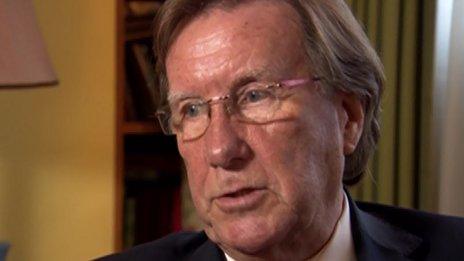Automatic pardon call for gay men historical sex crimes
- Published
Homosexual acts were a crime until 1967
Gay and bisexual men who have convictions for now-abolished sex offences should have them automatically wiped from their records, a charity has said.
In January, the Home Office awarded thousands of posthumous pardons to men who have since died.
But people still living must apply, external to have their convictions deleted.
Stonewall Cymru said the men had been "unjustly persecuted" and many did not know they could apply to be cleared.
Wednesday marks 50 years since The Sexual Offences Act of 1967 decriminalised sex between two men aged over 21 in England and Wales.
About 65,000 men were convicted under the old law, of which 15,000 are still alive.
Mabli Jones, campaign, policy and research manager at Stonewall Cymru, said men should not have to live with convictions no longer considered valid following the change in the law in 2012, external.
She said: "The change in the law was obviously a big step forward and we welcomed that and we were part of campaigning.
"But there were so many men unjustly persecuted by these laws and they deserve to get them removed."
She said some people were still unaware they could apply for a pardon and the charity "would welcome" them being automatic removed from people's records.
A Home Office spokesman said: "Convictions are not automatically deleted because the government needs to ensure that disregards are only granted to those who were convicted of offences that involved consensual behaviour and with persons over 16 years of age."
He added: "We are proud of the government's record in improving equality."

The latest ONS figures, external from 2015 show 1.6% of people in Wales identified as gay, lesbian or bisexual, compared to 1.8% in the UK.
Ms Jones said while attitudes towards LGBT people had improved in Wales, many - especially young people - still faced discrimination.
Stonewall Cymru's School Report 2017, external showed anti-LGBT bullying and language had decreased across Britain's schools since 2012, but the survey of 3,700 LGBT pupils found 45% still faced bullying for being LGBT.
Ms Jones said the charity wanted to see the teaching of all types of relationships become mandatory in schools, along with information on safe sex within same-sex relationships.
She said it was working with Education Secretary Kirsty Williams, who has set up an expert panel to advise the Welsh Government on how to address the issue, and make schools "more inclusive".
She added: "Hopefully, we are going to see big strides forward in that. We know it's a huge priority for young people."


Alan Turing was convicted of gross indecency in 1952, following which he was chemically castrated
In 2000, the age of consent for sex between two men was amended from 18 to 16, having already been reduced from 21 to 18 in 1994
In 2012, the law was changed to allow men with historical convictions for gay sex the right to apply to the Home Secretary to have them disregarded
This was allowed if it was consensual, both men were aged 16 or over and it did not constitute what remains an offence today, such as having sex in a public toilet
In January, a further change to the law allowed about 49,000 men, who had been convicted but have since died, to receive automatic posthumous pardons
It followed the pardoning of World War Two code-breaker Alan Turing for gross indecency in 2013, nearly 60 years after his suicide in 1954

- Published31 January 2017

- Published28 November 2012

- Attribution
- Published24 November 2016

- Published20 October 2016

- Published22 March 2017

- Published7 May 2016
